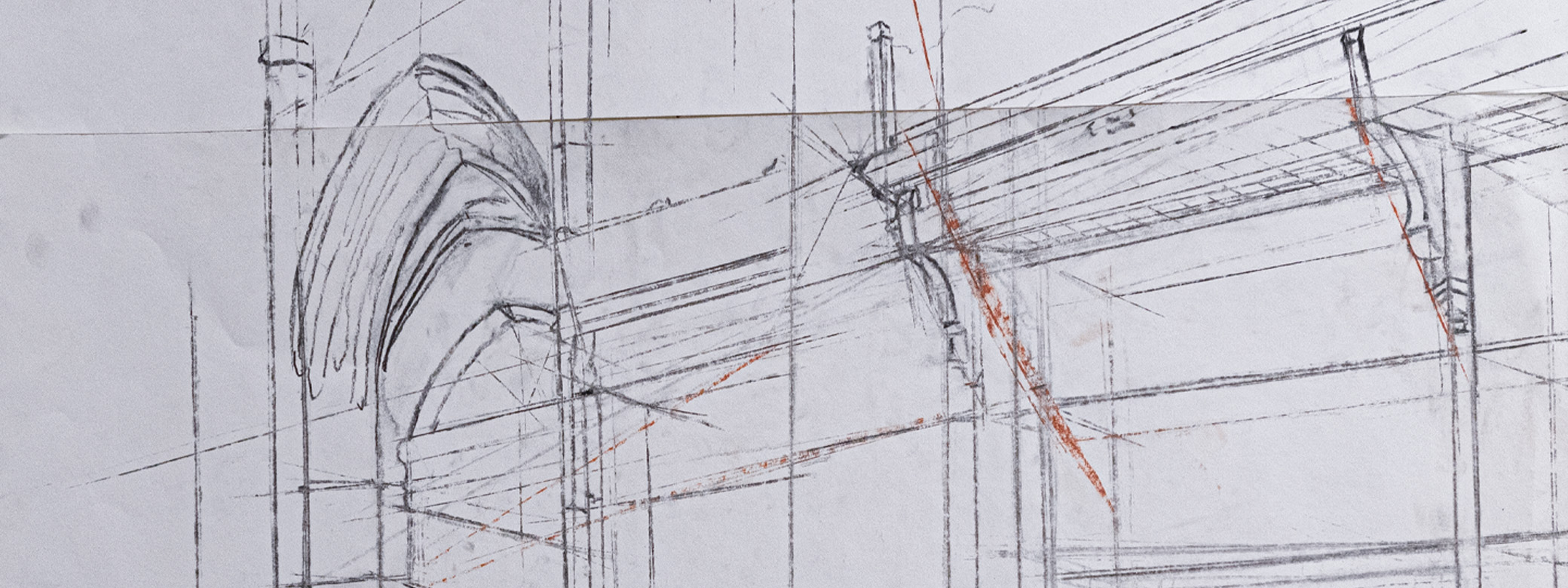School Policies
School's General Policies (2019)
School Director Letter: Misconduct 9.28.16
SoAAHD Student Learning Policies
Instructors' Information
Prof Zhi LIN
zhilin@uw.edu
Office: Art Building 314
By appointment on Tuesday (from 10:30 to 11:00 a.m.)
Classroom Information
Art Building 304
Door Key Code: LFA
Course Overview
Intermediate Drawing continues the visual principles students were exposed to in Beginning Drawing and Introduction to Figure Drawing. Problems in Intermediate Drawing are greater and conceptually more complex. More emphasis is given to developing student's individual qualities, critical thinking, and becoming more critical about your drawings. Intermediate Drawing will deal with specific visual problems by observing and investigating large still-life settings, human figures, and landscapes.
Course General Policies and Requirements
1) Participation in the class is one of the essential requirements for the course. Active involvement in-class critiques, peer reviews, and discussions will reflect the student's understanding of course materials. Receiving feedback from the instructor and classmates will be crucial for every student's learning in the class.
2) You are responsible for getting the information and assignments you missed from your classmates.
3) You should not do homework for other classes during class time and turn off all your other electronic devices.
4) Each week and each class, assignments, or parts of assignments, will be due. Expect approximately 10 to 15 hours of homework a week, or 2 hours per weekday, outside the class.
5) The instructor only grades classroom assignments supervised by the instructor and homework the instructor gives and has reviewed.
6) You should submit all your assignment work via this course site on CANVAS. Any submission via email to the instructor will not be accepted or graded.
7) In-class review of your actual work is essential in visual art class, and you must show your work on paper during the review. In other words, besides submitting digital images of your assignment work, you must participate in the class review and display your actual paintings, drawings, and printouts.
8) Missing assignments will adversely affect your final grade. Missing one assignment will cut one letter grade off your final grade. Late work will result in lower grades (at least one letter grade, e.g., A to B or 3.8 to 2.8).
Grading
All work for this class should be approached with a high degree of professionalism. Participation is required for all class sessions. If you miss a class for any reason, you must contact classmates to make up the work. Please make every effort to be on time. Arriving late is seen as a lack of interest and a sign of disrespect for your colleagues. Work that is not ready at the beginning of class will not be critiqued. Late work is heavily discouraged and will not be accepted without prior permission. Grading is based on your work quality during the quarter (visually and conceptually), your work process (the extent of exploration and variation throughout each project), and your participation in group discussions and critiques.
Final Grade
50% of assignment work
30% final project
20% participation
Grading system
(A) Excellent work that exceeds the requirements of the assignment and performance expectations of the class.
(B) Above-average work demonstrates a thorough understanding of the assignment, with enthusiastic participation in class.
(C) Average work that meets the minimum course requirements.
(D) Below-average work with minimal involvement in the class.
(F) Failure to accomplish the requirements of the assignment.
3.9-4.0 A, 3.5-3.8 A-, 3.2-3.4 B+, 2.9- 3.1 B, 2.5-2.8 B-, 2.2-2.4 C+, 1.9-2.1 C, 1.5-1.8 C-, 1.2-1.4 D+, 0.9-1.1 D, 0.7-0.8 D-, 0.0 F.
Grading criteria
All work for this class should be approached with a high degree of professionalism. Attendance is required for all class sessions. If you miss a class for any reason, it is your responsibility to contact classmates to make up the work. Please make every effort to be on time. Arriving late is seen as a lack of interest and a sign of disrespect for your colleagues. Work that is not ready at the beginning of class will not be critiqued. Late work is heavily discouraged and will not be accepted without prior permission. Grading is based on the quality of your work during the quarter (both visually and conceptually), on your design process (the extent of exploration and variation throughout each project), and your participation in group discussions and critiques.
A 3.8–4.0 is given to a student who has exhibited the highest possible performance in all aspects of the course—final projects, the design process, and participation are excellent. This student independently seeks out additional information on design and is highly committed/passionate about their work.
A 3.4–3.7 is given to a student who exhibits superior performance in all aspects of the course—the final projects, design process, and participation are uniformly of high quality. This student has a thorough understanding of all concepts presented, and is motivated to improve and succeed.
A 2.9–3.3 is given to a student who has good performance in most aspects of the course. This student follows a thorough design process, has good design work, and consistent participation that reflects a clear understanding of almost all concepts being presented.
A 2.5–2.8 is given to a student who has fair performance in the course. The final work is adequate, with a design process that reflects the minimum needed to complete assignments. Participation and motivation are moderate.
A 0.0–2.4 is given to a student with poor performance in the course. Projects are incorrectly prepared, incomplete, or missing. This student does not understand the majority of concepts presented and rarely participates in class. This student is not prepared for subsequent courses in design.
1) There are no specific written exams. The presentation of a portfolio, handing in the final assignment, and the last critique function as the final. During the scheduled final of the course, the instructor will give the final critique. Everyone must attend the scheduled final in person; failure to do so will result in receiving an F for the course. The UW website posts the final's schedule: www.washington.edu/students/reg/calendar.html.
2) At the end of the quarter, submit a portfolio of all work and only work for this course. In the portfolio, write your name, course number, and project name on the back of each of your paintings. And Put work in chronological order, from the first project to last.
3) Due date: Complete portfolios are due at the beginning of the quarter's last class. A late portfolio will result in course failure.
If you would like to request academic accommodations due to a disability, please get in touch with Disabled Student Services, 448 Schmitz, 543.8924 (V/TTY). If you have a letter from Disabled Student Services indicating you have a disability that requires academic accommodations, please present it to me so we can discuss any accommodations you might need for class.
Religious Accommodation
• Washington state law requires that UW develop a policy for the accommodation of student absences or significant hardship due to reasons of faith or conscience, or for organized religious activities.
• The UW's policy, including more information about how to request an accommodation, is available at Religious Accommodations Policy.
• Accommodations must be requested within the first two weeks of this course using the Religious Accommodations Request form.
Safety
• UW SafeCampus*
• Preventing violence is everyone's responsibility. If you're concerned, tell someone.
• Always call 911 if you or others may be in danger.
• Call 206-685-SAFE (7233) to report non-urgent threats of violence and for referrals to UW counseling and/or safety resources. TTY or VP callers, please call through your preferred relay service.
• Don't walk alone. Campus safety guards can walk with you on campus after dark. Call Husky Night Walk 206-685-WALK (9255).
• Stay connected in an emergency with UW Alert. Register your mobile number to receive instant notification of campus emergencies via text and voice messaging. Sign up online at www.washington.edu/alert
• For more information, visit the SafeCampus website at www.washington.edu/safecampus.
Art Supply Stores
Artist & Craftsman Supply – 4350 8th Avenue NE (206) 545-0091
Blick Art Materials – 1600 Broadway Avenue (206) 324-0750
University Bookstore – 4326 University Way NE (206) 634-3400
Art Supplies
The instructor will provide students with an art supply list attached to each assignment.

